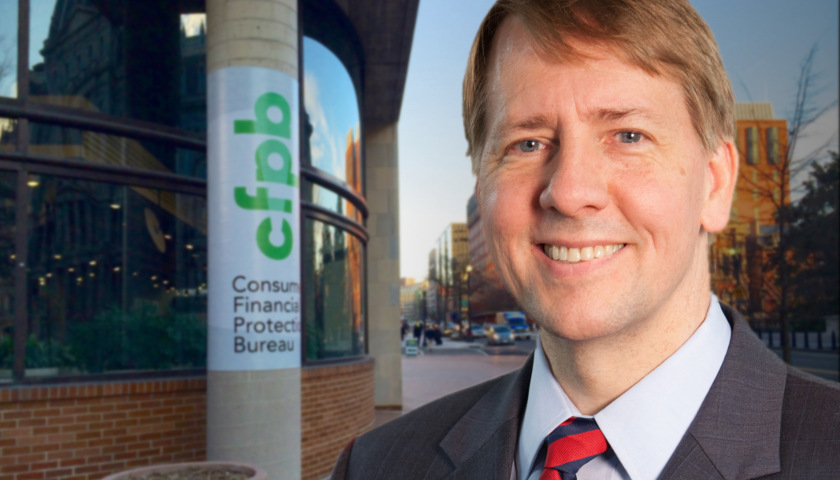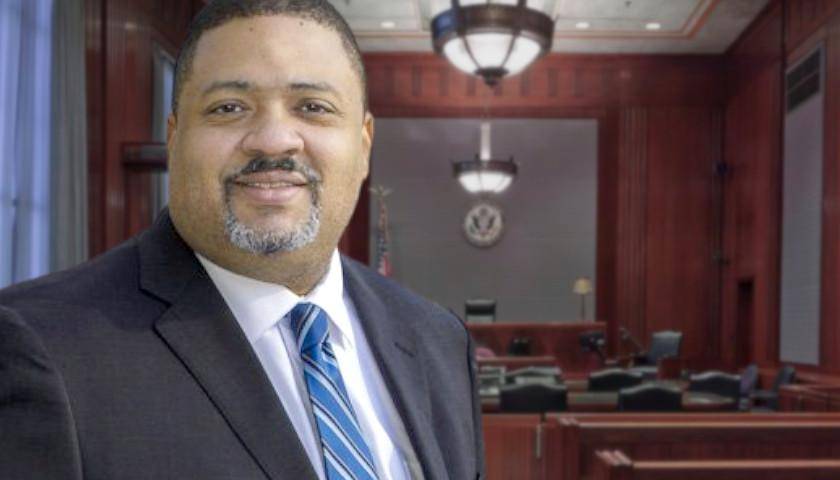Richard Cordray, the Democrat hoping to become Ohio’s next governor, has embraced all of his party’s favorite talking points, including Hillary Clinton’s 2016 mantra “diversity is our strength.”
But Cordray’s managing skills, when confronted with a diverse workforce, did not pass muster with minorities. In fact, if he were a Republican he would likely be held up as the poster boy for misogyny, bigotry and white supremacism.
The accusations go back to his tenure as the first director of the Consumer Financial Protection Bureau, or CFPB. Just a little digging into that agency’s history will turn up a heavy paper-trail linking Cordray to dozens of accusations that he oversaw a “hostile,” even “toxic” work-place environment.
A brainchild of Sen. Elizabeth Warren (D-MA), the CFPB was created by the Obama administration in the wake of the mortgage meltdown of 2008-2010. The agency opened its doors in 2011 with Ohio lawyer Cordray in charge. He was hand-selected by Warren, as were all of the agency’s senior managers, and served until Nov. 24, 2017, when he resigned. Days later, on Dec. 5, Cordray announced his candidacy for Ohio governor and now finds himself in a hotly contested race against Republican Mike DeWine.
The public record of Cordray’s directorship at CFPB, curiously kept under wraps by the Ohio media, shows a management style that doesn’t match up with his progressive rhetoric.
As recently as July 29, the Dayton Daily News reported on a stump speech Cordray gave at the Ohio State Fair in which he called for a “more diverse, more welcoming state,” adding that “businesses desire progressive communities when locating their workplaces.”
Cordray cited the 2016 North Carolina bill requiring transgender students to use bathrooms matching their birth gender as an example of how defending traditional social norms can scare off expanding industry.
Anything less than total capitulation to the social agenda of the Democratic Party would translate into a loss of jobs and economic prosperity, Cordray warned.
“We’re one or two bills out of the (Ohio) legislature from being a North Carolina and not being welcoming,” he said.
But an examination of the public record, alongside interviews with former employees by The Ohio Star, paint a picture of Cordray’s CFPB that was anything but welcoming and inclusive.
The agency was hit with an unprecedented number of complaints under Cordray’s watch, including alleged discrimination against women, blacks, older workers, immigrants and gays.
More than 200 complaints were filed between August 2013 and March 2014, with many of the employees describing the abuses as widespread.
Angela Martin, a senior enforcement attorney at the bureau, was one such employee.
In 2014, Martin told lawmakers at an oversight hearing of the House Financial Services Committee, which had an ongoing investigation into the abuses at CFPB, that she was discriminated against by managers. When she complained, she said, she was punished by being isolated and “stripped of responsibility,” reported Peter Schroeder in an April 2, 2014 article for The Hill titled “Employee Blasts CFPB As Hostile Environment.”
In the same article, it was reported that another employee, who was a legal immigrant, was referred to as an “f—ing foreigner” at a meeting, while another had been diagnosed with post-traumatic stress disorder caused by a hostile work environment.
Misty Raucci, a former investigator with Defense Investigators Group who examined CFPB issues at the request of the bureau, criticized managers for creating an intolerable workplace, according to The Hill. The environment at Martin’s branch at the CFPB was “one of exclusion, retaliation, discrimination, nepotism, demoralization, devaluation, and other offensive working conditions which constitute a toxic workplace for many of its employees,” she said.
Martin testified before the House oversight committee that “Women and minorities were singled out at the agency, deprived of training opportunities, suffered pay discrepancies with white male colleagues, and were passed over for promotions.”
According to agency data obtained by American Banker, the CFPB managers had a “recurrent pattern” of rating white staffers higher than racial minorities in performance reviews. These reviews were used to grant raises and bonuses.
The data showed whites were twice as likely in 2013 to receive the agency’s top grade than were African-Americans or Hispanic employees.
Overall, 74.6 percent of whites received top-tier ratings of 4 or 5, versus 65.5 percent of Asians, 65.2 percent of Hispanics and 57.6 percent of African-Americans, according to an internal CFPB report.
Staffer: CFPB was run like ‘plantation’
Kevin Williams, a former CFPB quality-assurance monitor who is black, compared the atmosphere to a “plantation” because of how black staffers were treated, according to another report from June 18, 2014 in The Hill.
Williams said blacks were “constantly belittled” and stereotyped. He recalled a luncheon in which they were offered fried chicken while others dined on more upscale fare.
In the third of five House Financial Services subcommittee hearings into the burgeoning mess at Cordray’s agency, Williams unloaded the following bombshell:
“I was a charter member in the intake unit, which, indeed, came to be referred to as the ‘plantation’… There, I personally witnessed and was the victim of racial discrimination perpetrated by black as well as white managers. The unit was dubbed the ‘plantation,’ because when we started, the majority of black employees were assigned to intake, which was basically data entry.”
The Star reached out to the Cordray campaign for a response to these allegations but did not hear back.
In some cases, black managers were just as guilty as whites in their mistreatment of black employees, one former examiner at the agency told The Star.
Robert Cauldwell, who served five years at the agency until his retirement due to health issues, said he saw all the workplace complaints in his dual role as the first president of the CFPB labor union.
“We had some racist managers, and sometimes there were even some black managers who wouldn’t let black folks get ahead,” Cauldwell said.
Cauldwell, 46, testified at the fifth congressional oversight hearing in June 2015 titled “Examining Continuing Allegations of Discrimination and Retaliation at the Consumer Financial Protection Bureau.” At this hearing he described a level of abuse he said he had never experienced in all his years of service in the U.S. Army, as a regulator at the FDIC, or his private-sector jobs. While he described himself as gay and had his own complaints of discrimination, he told The Star that black women encountered some of the most egregious treatment at the agency.
He called the abuses “systemic” and “beyond the pale.”
“This idea that Rich Cordray was fair to employees and a proponent of inclusiveness is just wrong. It’s a joke,” he said. “Not only was there unfair systems in place but we had the most EEOC complaints of any agency in the federal government even though we were one of the smallest agencies, by far, with only about 1,200 people at the time.”
Cauldwell said Cordray did not hire the abusive managers – most were hired by Warren – but when informed of the abuses, he did nothing.
“Rich Cordray knew every bit of my complaint. He was involved in the handling of it,” Cauldwell said. “And that’s not the first time he got involved in complaints.”
Keith Ellison tries to smear complainant
When he finally agreed to testify after two years of declining to do so, someone in Cordray’s agency leaked information to Rep. Keith Ellison, D-Minn., who used it to try to discredit Cauldwell on the witness stand.
Cauldwell said a woman filed a complaint against him that was dismissed for lack of merit, but all complaints are investigated and it was in the early stages.
“Keith Ellison comes to the podium and starts asking me questions that had nothing to do with my testimony. I went to testify on the treatment of nine African-American women and Ellison says ‘Mr. Cauldwell is it true you were accused of mistreating women at the CFPB?’ So they let it out without my permission, leaked my confidential information to Ellison just to get at me because I took on Cordray. In the end I was exonerated, but of course I had to say ‘yes I am being investigated.’ But look at the news now coming out on Ellison [who is now accused of sexual misconduct by multiple women]. I feel even more vindicated.”
Cauldwell, himself a lifelong Democrat, said CFPB was supposed to investigate the source of the leak but never did. He filed an ethics complaint against Ellison, which went nowhere.
“The performance review system was punishing blacks,” he said of the agency. “You were five times more likely to have a bad grade if you were black and three times more likely if you were a woman. So we had to revamp that. These were managers who knew better, experienced government workers or private-sector managers.”
While the CFPB only admitted discrimination against one woman, Cauldwell said the agency shelled out $5 million in back pay to cover mismanaged performance reviews.
“This idea that Rich Cordray was fair to the minorities was just wrong,” he said.
According to a blistering 79-page report filed in June 2016 by the Government Accounting Office, 25 percent of blacks and 20 percent of Hispanics reported racial differences were not respected or valued by the CFPB’s top management.
“If this had been a private-sector company or any other agency they would have thrown him [Cordray] out on his ear,” said Cauldwell. “When I asked Elizabeth Warren about this I got no answer. Fifty percent of black women felt they were discriminated against, 25 percent of all minority employees, that is a huge, huge number, so for Rich to say he supported inclusiveness is appalling, pathetic and a sham.”
He said Cordray’s downfall was he let his managers run the agency.
“There is a difference between being a good manager and being a good leader. He is not a leader, or someone who can control a situation. What’s going to happen when there are problems in the black community? He will not be able to handle that situation — something like the Flint Michigan water crisis. This is not what he’s built for. He is dry, he is dull, I think he cares about people, but he does not know how to handle problems. After two years I finally had to go testify against him. I turned down the first opportunity and waited two more years, figuring I would give him a chance, but nothing changed, so I had to testify.”
Cauldwell said “99 percent” of the staff at CFPB are Democrats who voted for Hillary Clinton, many of them contributing to her campaign.
Fear ruled the roost
The manager calling an immigrant employee “a f—ing foreigner” was perhaps the most blatant case of abuse recalled by Cauldwell, but he said the manager was never disciplined because a key witness was afraid t0 testify.
“Ali was 25 years in the government, he had been a leader at this previous position, he came to CFPB to try to help them out and this is the most ridiculous thing I’d ever seen in my life,” he said. “The person that witnessed it refused to testify for fear of losing his job. That was the atmosphere people were forced to work in.”
Another 25-year employee, an examiner who was African-American, was asked by her manager to change a case report.
“You’re telling me to rewrite my exam report, and what authority do you have for that?” the woman reportedly asked.
“They crucified her for asking why,” Cauldwell said. “She just asked what qualifications they had to ask her to change a report, so they gave her a review rating of 1 [on a scale of 1 to 5]. Only African-American females got 1s. I was one of the few who saw all the reports due to my position as union president, and I can tell you, only African-American females, five of them, got a 1.”
Cauldwell said these were all problems brought directly to Cordray in “multiple phone conversations” with Cordray or his executive assistant.
“They always listened, that was never a problem,” he said. “What I had a problem with was them executing the corrections afterward. We were all Democrats, and Democrats are supposed to have principles that we don’t eat our own, we reward hard work, regardless of whether you’re Democrat or Republican, black or white, gay or straight. That’s not what we did at CFPB. It was almost the most autocratic place I’ve ever worked in my life.”




